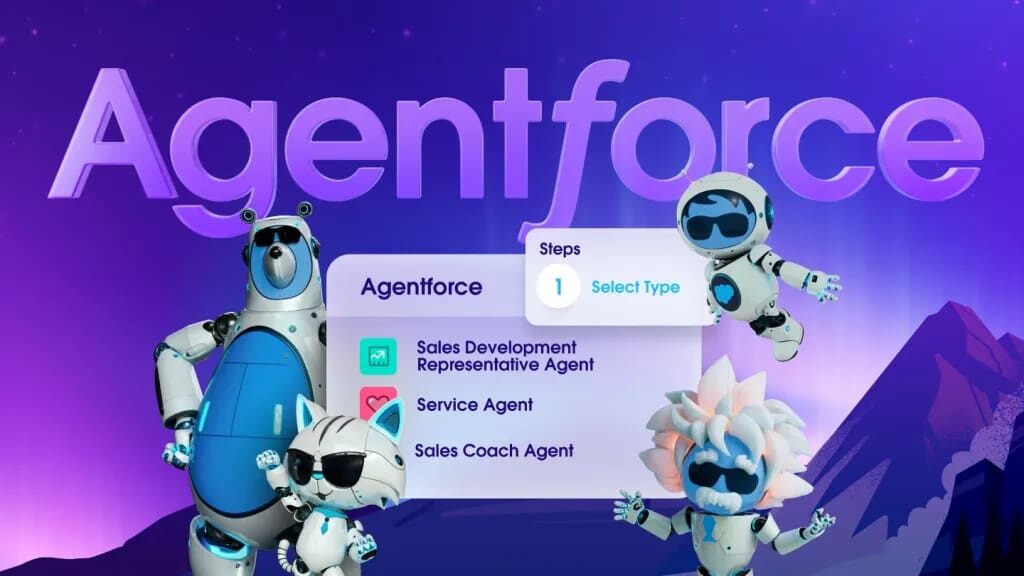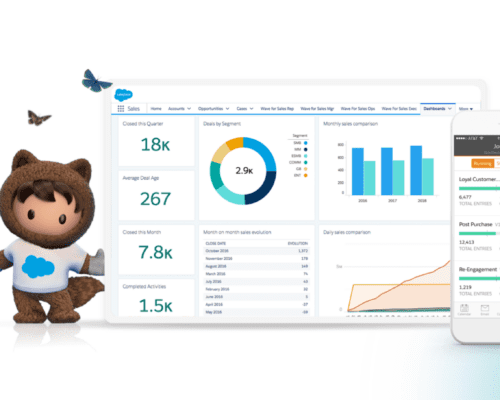In today’s fast-evolving digital landscape, AI technology is reshaping industries at a speed that is leaving many business leaders feeling an intense sense of urgency. I think it is fair to say that by now, AI isn’t just a competitive advantage anymore; it’s quickly becoming a business imperative.
For organisations relying on platforms like Salesforce, staying ahead means understanding how to unlock AI’s potential in a way that drives real results. Yet, integrating AI solutions such as Agentforce into existing systems poses both incredible opportunities and daunting challenges.
Companies are now asking: How do we harness this technology effectively, make the most of our data assets, and, crucially, ensure AI investments translate into tangible value?
This article will explore how businesses can leverage Salesforce Agentforce to maximise ROI, ensure technical feasibility, and navigate the key challenges in integrating AI. By focusing on areas like data readiness, AI strategy, technical infrastructure, and user adoption, organisations can build a solid foundation for success with Salesforce Agentforce.
Five things to think about when considering Agentforce
1. Understanding AI Implementation Dynamics
Use Case Identification – The first step to a successful Agentforce implementation is identifying very specific tasks and processes where AI can add the most value and where the use case can be deployed in a safe context. Organisations should target repetitive, time-consuming tasks, leaving those that require complex decision-making to humans. This approach helps to prioritise resources and allows for a phased implementation focused on high-impact areas.
Customisation – Agentforce’s customisation capabilities, particularly through Agent Builder, allow organisations to tailor the AI functionality to their unique business needs. Your ability to customise these agents is crucial for ensuring that AI aligns with your company’s specific workflows and can drive meaningful impact.
Customisation Complexity – Tailoring Agentforce to fit specific business needs can be complex, particularly in large organisations with intricate workflows; hence, before starting to implement new ways of working, you should make sure your implementation is robust and clean of technical debt. Companies should plan for adequate resources and expertise to manage customisation requirements effectively, as they may overlap with other functional components already deployed.
Performance and Scalability – Ensuring Agentforce scales effectively as the organisation grows is vital. Performance issues can hinder user satisfaction and operational efficiency, so a scalable infrastructure is essential for long-term success. Start small and roll out cautiously to make sure that you identify potential scalability barriers early on in the deployment process. Agentforce is designed to handle unstructured data and process information in real-time, demanding a robust infrastructure to support growing data volumes and usage. Building a scalable foundation ensures your system can handle Agentforce’s full potential over time.
2. Data is Where the Challenge is
Complex Data Ecosystems – Integrated Agentforce would benefit from having access to data within the existing digital ecosystem, including legacy CRM, a tech Product (common in Fintech), ERP, and third-party applications. This often leads to data strategy issues, such as data inconsistencies, which lead to potential disruptions. Addressing these challenges early on is essential for a smooth implementation.
Data is the backbone of any AI-driven operation. For Agentforce to perform optimally, companies must ensure high-quality, well-organised, and accessible data. Salesforce’s Data Cloud is at the core of Agentforce, processing data in real-time to inform its decision-making and actions. By preparing your data infrastructure for seamless real-time integration across various sources, Agentforce will be able to provide more accurate and actionable insights.
Check out this article on Knowledge Management as a cornerstone to maximise AI’s potential.
Connector Utilisation – Salesforce offers over 200 pre-built connectors for Data Cloud, enabling companies to easily integrate their existing data sources. Leveraging these connectors allows Agentforce to access a comprehensive, unified view of business information, ultimately improving decision-making and operational efficiency.
3. Adoption – Technology ROI is All About Getting People to Use it
AI Skill Gap – Investing in training or hiring specialised talent ensures organisations have the knowledge needed to make the most of Agentforce’s capabilities. A successful AI integration depends on your team’s ability to effectively work with the new technology.
Many companies are still unaware of the expertise required to fully leverage AI.
Salesforce has invested $50 million in AI workforce upskilling, and companies should take advantage of these resources to train employees in the skills needed to operate alongside AI agents. An upskilled workforce can maximise AI potential and drive broader organisational change.
AI-Human Collaboration – Striking the right balance between AI and human involvement can be complex. Effective collaboration between AI and employees ensures that AI augments human capabilities, enhancing productivity and efficiency.
User Adoption – Ensuring that employees adopt the new system can be challenging, especially if there is resistance to change or insufficient training. Establishing a supportive, user-friendly onboarding experience can help improve adoption rates.
4. Compliance and Security
Regulatory Compliance – For organisations in highly regulated sectors like finance, ensuring Agentforce’s compliance with industry regulations is critical. Addressing regulatory requirements upfront mitigates potential legal and operational risks.
Data Security – Data security is paramount when integrating AI solutions. Maintaining robust security measures helps protect sensitive data, ensuring compliance with regulatory standards and preventing potential data breaches.
5. ROI Measurement and Optimisation
Investment Justification – Justifying the investment in Agentforce requires a clear understanding of the expected ROI. Defining metrics for success and continuously tracking performance helps to validate the investment.
Organisations often find it challenging to measure the precise value AI brings, so clearly establishing how specific use cases will deliver quantifiable value from the start enables companies to demonstrate Agentforce’s impact and align its outcomes with business objectives.
KPI Definition – Measuring Agentforce’s impact is critical for justifying its investment. Define key performance indicators (KPIs) such as case resolution time, customer satisfaction scores, and agent productivity to track AI’s effectiveness. Clear KPIs enable organisations to understand where Agentforce adds value and identify areas for further optimisation.
Measuring efficiency improvements, such as reduced case resolution times, provides valuable insights into Agentforce’s performance. Wiley reported a 40% improvement in case resolution in the initial weeks of using Agentforce, highlighting the immediate impact AI can bring to customer service operations.
Continuous Improvement – AI systems are dynamic, and regularly evaluating Agentforce’s performance can uncover trends and areas for improvement. Leveraging features like Agentforce’s case summarization can help to identify patterns, informing ongoing adjustments and enhancements to keep the system performing at its best.
Resource Allocation – Determining where to allocate resources is key to understanding Agentforce’s value proposition. By automating routine tasks and freeing human agents for complex cases, organisations can see significant cost savings.
Let’s Talk!
I hope that this brief look at Agentforce resonates well with organisations looking to gain clarity around AI strategy and practical implementation steps.
For businesses already using Salesforce but unsure if they’re maximising their capabilities, now is the time to act. If you feel that your organisation could benefit from a clearer AI strategy or need expert support in making this technology work seamlessly within your operations, we’re here to help.
Contact redk to explore how a well-defined AI strategy can transform your Salesforce experience and drive meaningful outcomes in this fast-paced digital world.










